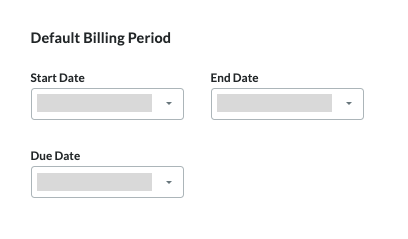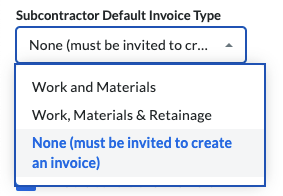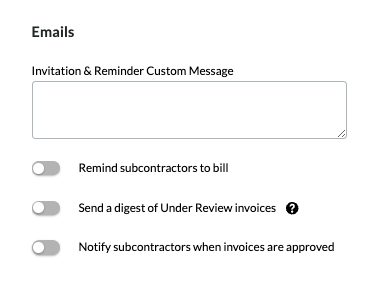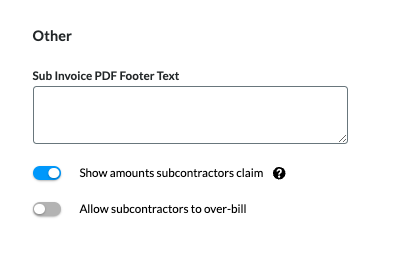Configure Settings: Progress Billings
- Last updated
- Save as PDF
For Procore Customers in the United States
 When your company applies the 'Owners English' or 'Specialty Contractors English' point-of-view dictionary, you'll see different tool names and term changes in the user interface. Learn how to apply the dictionary options.
When your company applies the 'Owners English' or 'Specialty Contractors English' point-of-view dictionary, you'll see different tool names and term changes in the user interface. Learn how to apply the dictionary options.
- To learn the differences: Show/Hide
-
This table shows the differences in tool names (bold) and terms across the point-of-view dictionaries for Project Financials. These dictionaries are available in US English only. The default dictionary is designed for general contractors, which means that you will need to work with your Procore Administrator at your company and your Procore point of contact to access the other dictionary options.
General Contractors
English (United States) - Default
Owners
English (Owner Terminology V2)
Specialty Contractors
English (Specialty Contractor Terminology)
Invoicing Invoicing Progress Billings Owner Funding Owner Owner/Client Owner/Client GC/Client Prime Contract Change Order Funding Change Order Client Contract Change Order Prime Contracts Funding Client Contracts Revenue Funding Revenue Subcontract Contract Subcontract Subcontractor Contractor Subcontractor Subcontractor Schedule of Values (SSOV) Contractor Schedule of Values (CSOV) Subcontractor Schedule of Values (SSOV)
-
Objective
To configure settings for the Payment applications tool as an payment application administrator.
Background
An payment application administrator should configure the Payment applications tool settings before your team members create any payment applications on a Procore project.
Things to Consider
Steps
- Navigate to the project's Invoicing tool.
- Click Configure Settings
 .
. - Under Settings, configure the options.
Default Billing Period
These settings populate the date fields in the 'Set Up Billing Period' prompt when users Create Manual Billing Periods with the Payment Applications Tool.
Tip
Want to simplify billing period creation for future cycles? An payment application administrator can configure default billing period dates to preset the dates in the From, To and Due Date fields in the 'Set Up Billing Period' prompt. See Create Manual Billing Periods with the Payment Applications Tool. If you don't complete this configuration, no preset dates show. Instead, you will see: mm/dd/yyyyTo configure the Default Billing Period settings:
- Choose these dates:
- Start Date. Accept the default start date of '1st of the month' or choose a different date. This populates the 'From' date in the prompt.
- End Date. Accept the default end date of '31st of the month' or choose a different date. This populates the 'To' date in the prompt.
- Due Date. Accept the default due date of '25th of the month' or choose a different date. This populates the 'Due Date' field in the prompt.

-
Select a Subcontractor Default Payment application Type option from the drop-down list:
- Work and Materials. Allow payment application contacts to create payment applications to bill for work and materials.
- Work, Materials & Retention. Allow payment application contacts to create payment applications to bill for work, materials and retention release.
- None (must be invited to create a payment application). Only allow payment application contacts to create payment applications after sending an 'Invite to Bill'.

Note
The 'Invoice Type' is always set to 'Work, Materials & Retention' when a user with 'Admin' level permissions on the Commitments tool creates a new payment application.
- Click Update.
Lien Waivers
General Availability in Select Markets (United States)
 Procore Pay
Procore Pay These settings are only available with Procore Pay. For instructions:
Emails
Use these settings to adjust the Payment applications tool's email messages.
To configure the Emails settings:
- Type a message for your payment application contacts in the Invitation & Reminder Custom Message box.

Tip
Where is this text used? Procore includes this text in the 'Invite to Bill' and automatic reminder emails. See Send an 'Invite to Bill' to a Payment Application Contact. - Move the toggle to the right to turn an option ON. Move it to the left to turn it OFF. The default setting for these options is OFF:
- Remind subcontractors to bill. Turn ON to send automatic email reminders to payment application contacts. You can set the email frequency—Every day, Every 2 days, or Every 3 days from the Subcontractor Reminder Frequency drop-down list. Procore stops sending reminders after the due date. The system sends the first reminder to bill after the subcontractor is invited, based on your configured frequency.
- Send a digest of Under Review payment applications. Turn ON and select Weekly from the Under Review Digest Frequency drop-down list to send a weekly digest summary every Monday. Payment applications for the current billing period are included in this digest message when they are in the Draft, Under Review or Revise and Resubmit status. Digest messages are sent to members of the 'Invoice Distribution' drop-down list, located in the Default Distributions section of the Configure Settings page in the Commitments tool. See Configure Settings: Commitments.
- Notify subcontractors when Payment applications are approved. Turn ON to automatically send an email notification to payment application contact(s) when a payment application's status is changed to Approved or Approved as Noted by a payment application administrator. See Review a Subcontractor Payment application as a Payment Application Administrator.
- Click Update.
Other
Use these settings to configure the system's behaviour for subcontractor payment applications:
To configure the Other settings:
- Optional: Sub Payment application PDF Footer Text. Enter the footer text for the exported payment application PDF. See Export a Subcontractor Payment application. This field is useful for adding information about local regulations and compliance statements.

Note
The 'Sub Payment application PDF Footer' text only appears when a user with 'Admin' level permissions on the project's Commitments tool generates the PDF. It does NOT appear on any PDF generated by a user with 'Read Only' or 'Standard' level permissions on the Commitments tool. - Optional: Show Amounts Subcontractors Claim. If you enable this setting, main contractors can differentiate between what a subcontractor claims and what the main contractor approves.
Note
In Australia and New Zealand, enabling the 'Show Amounts Subcontractors Claim' setting will also let main contractors create a payment programme PDF in response to the payment application. See Review a Subcontractor Payment application as an Administrator and Create a Payment Programme.- Total Claimed Amount. This reflects the 'Proposed Amount' column on the payment application's Detail tab. It excludes retention.
- Total Approved Amount. This reflects the 'Work Completed this Period' plus 'Materials Presently Stored' on the payment application's 'Detail' tab. This value also excludes retention.
- Reasons for Difference. When there is a difference between the claimed and approved amounts, include those reasons here. See Review a Subcontractor Payment application as a Payment Application Administrator.
- Allow Subcontractors to Over-Bill. Choose the appropriate option:
Tips
- How does this setting work? See How do I prevent or allow overbilling on a subcontractor payment application?
- Want to prevent overbilling on all of your company's Procore projects? A Procore Administrator can turn the 'Prevent Overbilling on All Projects' setting ON in the Company Admin tool. This prevents users from saving a payment application if any of the payment application's line items exceed 100% of the budgeted amount in the commitment on all of your company's Procore projects. See Set the Defaults for Your Projects. When ON, users can't change the 'Allow Subcontractors to Over-Bill' setting on a project.
- To prevent over-billing. Move the toggle to the left to turn the option OFF. This prevents users from saving a payment application if any of the payment application's line items exceed 100% of the budgeted amount in the commitment on this Procore project.
OR - To allow over-billing. Move the toggle to the right to turn the feature ON. This is the default setting. This setting prevents users from saving a payment application if any of the payment application's line items exceed 100% of the budgeted amount in the commitment on all of your company's Procore projects.
- Click Update.
Beta Subcontractor Workflow Settings
These settings are only available if your company enables the Workflows tool and assigns a workflow template to the project. See Assign a Custom Workflow Template to a Project. See Configure a Custom Workflow Template for Subcontractor Payment applications on a Project.
Beta Owner Payment applications Workflow Settings
These settings are only available if your company enables the Workflows tool and assigns a workflow template to the project. See Assign a Custom Workflow Template to a Project. See Best Practices for Creating an Owner Payment application Workflow (Beta).

